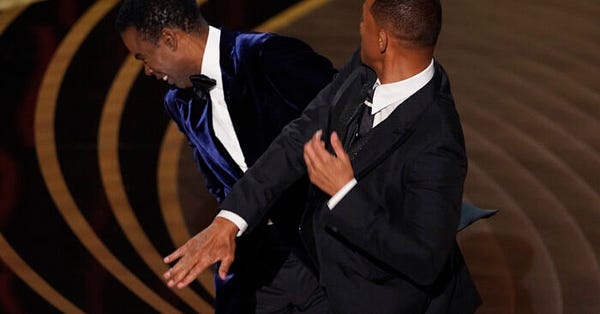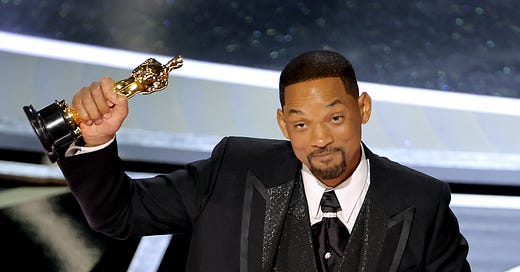Every Day Is April 1
ALL THE REACTIONS were bad the morning after Will Smith smacked Chris Rock in the face onstage at the Oscars, but one reaction caught my eye, because someone else had hailed it as the worst reaction:

It was and is my conclusion, based on too much exposure to internet references and conventions, that this tweet was not written in earnest. The account behind it had only one follower, and the "my six-year-old" construction is widely used in parodies—although the reason it's used in so many parodies is that it is also widely used in sincerity.
Was it meant to be an obvious joke? Was it meant to bait people? Did that matter? Down below, someone else had shared a genuine tweet from a major American newspaper that did, in fact, compare Will Smith to Volodymyr Zelensky:


The feeling this brought on was familiar. I'd felt it a little over a month before, on a completely separate occasion involving celebrities and slapping, when I read the Variety headline "Arnold Schwarzenegger and Logan Paul Are Hosting a Slap Fighting Tournament." Was the announcement a parody? Was it a stunt? When the former action movie star turned California governor joined with the YouTube brat turned celebrity boxer to put on an exhibition where people took turns slapping each other in the face, did the fact that people apparently did participate—some of them getting knocked unconscious—make it real?
These sorts of questions, and the state of exhaustion that goes with them, used to come around once a year: on April 1. For that one day, it was a struggle to recognize what was actual and what was a put-on. Everyone's standards about acceptable humor—was it funny just to trick people into believing something false, or did there need to be an underlying joke?—clashed horribly for 24 hours, and then it all subsided. The news went back to being news, the comedy went back to being comedy, the opinions went back to being good or bad opinions (mostly bad). For the next 364 days, hoaxes would be noteworthy accomplishments.
Now—worse than the three weeks of sleazy Halloween costume parties or the 40 days of Christmas—what we live in is a constant, unrelieved state of April Fool's. Everything is potentially a goof or a bit or an ironic pose, but also potentially real, and capable of operating in multiple ways at once. An aggressively obnoxious opinion about other people's poverty embeds a self-deprecating reference to the writer's privilege. Macedonian conflict-farmers are abrasive on purpose, to win attention, and other people pay them attention and start forming social norms around those feigned positions.
The language we use to try to understand the condition only makes it worse: someone is "trolling" when they pretend to be serious to provoke outrage, or when they make a joking argument that's designed to fool some people but not others into believing it, or when they make an absurd deadpan parody that people assume has to be real anyway. Campaigns against "misinformation" or "disinformation" fall into the trap of presuming that the purpose of anything is to inform anyone, rather than to promote a fleeting, contingent, and temporarily useful reaction.
Actual world events are rolling improvisations, openly based on whatever people can be convinced to believe in. State legislatures are passing real penalties against made-up complaints. Disease-control policy is being rewritten to respond to feelings about feelings. Vladimir Putin is complaining about J.K. Rowling being canceled.
Every hour of every day there's something else, only it doesn't quite resolve into a something. What if Will Smith slapping Chris Rock was a staged bit? What if the Ghost of Kyiv was real? What if Vladimir Putin used Havana Syndrome technology against peace negotiators? What if Elon Musk is launching a new social media platform?
The premise driving April Fool's was that nobody could keep their guard up all day. Sooner or later you'd forget what date it was, and a setup that should have been ridiculous would strike you in an unwary moment as plausible. A shocking news headline would successfully shock you into believing it. A brand would trick you into repeating its brand name.
Now that's the only thing the brands do. Every TV commercial is a parody of a TV commercial. Countries are shitposting their way through shooting wars. The old rigid memory of what it meant for things to be either literal or serious is tugged this way and that, for the sake of malice or entertainment or for no reason at all except that everybody else is doing it. The joke is on everyone, all the time, and there's no way to get out from under it.





